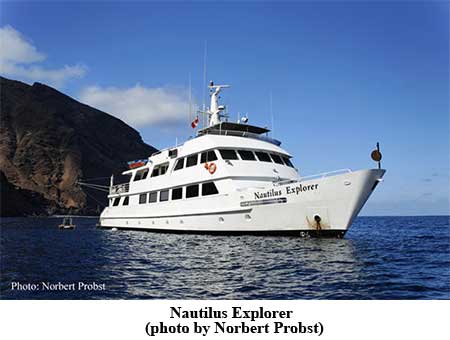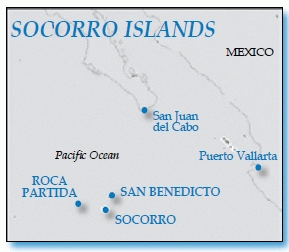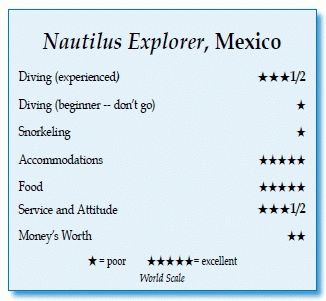Nautilus Explorer, Socorro Islands, MexicoContents of this Issue: Nautilus Explorer, Socorro Islands, Mexico Putting a Camera on a Shark: Not a “Brilliant Idea” Avoid New Liveaboards for at Least a Month Belize, Bonaire, Florida, Philippines . . . Lionfish Petition Update: We Still Don’t Like It The Biggest Dive Lawsuit Payout to Date This Dive Shop Paid $103,000 for a Death by Boat Propeller Starving Underwater Photographers: Part II Spineless: A Spectacular Look at Marine Invertebrates What to Know About Photo Contests and Contracts A Better Heart-Check Tool than a Stress Test? Editorial Office: Ben Davison Publisher and Editor Undercurrent 3020 Bridgeway, Suite 102 Sausalito, CA 94965 big animals, little value from the July, 2015 issue of Undercurrent
Dear Fellow Diver: After years of maintaining my bucket list, I finally signed up for a dive trip to the Revillagigedos (Socorro) Islands on the Nautilus Explorer when my dive shop booked an eight-day sojourn there, with six diving days. But as glad as I was to go, I found many problematical aspects about the dive operation and the diving itself. It's a 220-mile, 24-hour steam from Los Cabos, Baja California, to the first dive. Because it is a rough open journey on the Pacific Ocean, I started my Bonine a couple days before boarding to combat my potential motion sickness (it worked).
For the $3,200 I paid, I would expect more staff. The two young divemasters (one age 19) had to manage 25 divers, and they would always surface early to lend a hand on deck. The additional crew included the captain and his mate, a chef, two hostesses, an engineer and a deckhand. The staff was mostly Canadian and American, with Irish chef Jayne in charge of the kitchen. The mate or captain often drove the panga. I dived separately from the group, which I often prefer, but did so in these rugged waters partly because there were so few dive guides.
Sometimes I entered and exited off the stern of the boat, when they were able to anchor in shallow water; otherwise, we dived from rigid inflatable boats (RIBs). The Explorer's back deck slopes downward, rather like a driveway, and is lined on both sides with tanks and gear. With the boat rocking, you can imagine waddling down it wearing 70 pounds of gear in high seas was terrifying. No style points -- just staying upright was enough. Then one flopped into the RIB. I didn't cotton to their system of running the RIB bow up onto the back deck, then having to clamber aboard in full gear while the surge roared. Indeed, getting on and off either the transom of the Nautilus Explorer directly, or the RIBs was tricky and rough in most seas. I was surprised no one was hurt. Since it was a skeleton crew, there was not always someone there to help catch teetering divers. One RIB had a ladder, but the other required a Shamu-style entry from the water. Though it's wise to be in good shape for diving, not even Herculean strength can prevent a rogue wave from turning one ass-over-teakettle. The crew worked hard to haul us out of the water, but a few more strong hands would have made that task go more smoothly. A crew member told me that the deck will be flattened in dry dock this month, and the two worn-out RIBs will be replaced with sturdier boats with ladders and large outboards. While entries onto the new pangas should be safer than the current system, we had to dance with the ones that brung us. At Socorro Island, our morning began with a visit from the Mexican Navy, a feature of every trip. After their inspection, we did our first dive day at Cabo Pierce, which featured great views of other divers' bubbles but virtually no animal encounters. Part of it may be due to the guides' inexperience. The 19-year-old divemaster had been on the boat all of three weeks and was hardly a naturalist. The other divemaster with a naturalist bent was ill for part of the trip. And surely what one encounters depends on nature itself; the animals aren't on leashes or under contract. I was there during shoulder season in April, so perhaps that is why we saw fewer big boys. It's a curious paradox. On the one hand, I love diving solo and not being ridden or babysat. Yet, on the other, I missed the eagle eye of an informed, experienced and enthusiastic underwater naturalist. Megafauna are great, but so are the little guys. The sites are similar to Costa Rica's Cocos Island -- rocky, with little or no coral, either soft or hard. Fish teemed, particularly schools of horseeye jacks and trevally; white-tip and black-tip sharks darted around, and at sites like Roca Partida, white-tips piled on top of each other in crevices in the wall. It reminded me of college students stuffing into a Volkswagen.
The Nautilus Explorer is a comfortable craft. The second deck, with a hot tub and lounge chairs, was a pleasant place from which to enjoy a beer and watch the stars. The salon boasts a TV, DVD player, Mac PC and lots of fish and critter reference books. A previous guest had pinched the Galapagos/Eastern Pacific fish ID guide -- for shame! After dinner, many divers enjoyed a nightcap (margaritas were popular, but the house wines and Mexican beers were good as well, around $6 per drink) and socialized until exhaustion forced bedtime. The divers came from all over Europe (Italy, Germany, France), and based on the many languages featured in the books in the salon, it's a popular destination for Europeans. English was the lingua franca. I really liked the food, and Jayne honored special dietary requests. Her knowledge of world cuisines was passionate and earned the hard way by working in kitchens from Indonesia to Portugal. The breakfast buffet included frittatas, eggs, turkey bacon and excellent baked goods. Lunch featured lasagna, pizza, a deli buffet, salads and always a good soup. Dinners were served family-style on platters at each of three tables, and included salmon with fruit salsa, achioterubbed chicken, beef stroganoff, salads garnished with mango and dried cherries; desserts included red velvet cupcakes and berry crumble with ice cream. Jayne also made excellent cookies and coffee cakes. Coordinating dive times ran into conflicts with the Nautilus Explorer's sister boat, the Belle Amie, pushing dives back an hour or so because the sites were so small that both boats could not put all divers in simultaneously. It was annoying to be ready for a 7:15 a.m. dive only to be informed that thanks to the company's other boat, with its 30 divers, our time would be an hour later. Water ranged from 72 to 76 degrees, visibility ranged from good to low, and most divers wore 7mm one-piece suits and hoods. Ironically, Mexican regulations forbid divers to wear gloves, but there is hardly any coral, so why one is prohibited from wearing gloves in roaring current is hard to fathom. You are also not permitted to carry an underwater noisemaker or even a flashlight for peering into holes during the day. I frankly ignored the glove and light rules, and thus, did not rip apart my hands when I needed to hang onto a rock. Wisely, the itinerary ended with a guaranteed crowd-pleaser, the Boiler off San Benedicto Island, an underwater pinnacle boasting manta cleaning stations, cavorting dolphins and the occasional silky shark. The number of mantas was thrilling -- six? 10? 20? -- and their enormity and grace profoundly meditative. They cruised by, sometimes cephalic fins furled and sometimes unfurled, as Clarion angels nipped and groomed them, jacks slipstreamed and remoras clung. I swear the dolphins showed off: I'm a marine mammal, I'm cute and look at what I can do! And here is where I sighted a young whale shark two days running, and spent some quality time with him. Despite my delight in the encounters with megafauna, I remain ambivalent about the trip. It was expensive for the value received: add Nitrox, tips, etc., to the $3,200, and it ran almost $600 per day of diving, high by my standards. Furthermore, many of us divers picked up an intestinal bug, perhaps food borne, and lost at least one day of diving. I can't think of anything I could have done differently to avoid picking up the bug: I washed my hands carefully, drank clean water and have always done well, no matter how funky the destination. For that kind of money, I expect more help with my gear, more comfortable pangas, and something special, maybe massages! Though the food was excellent, cabin comfortable enough, and diving sometimes exciting, the absolute cost is high for this trip. Even the ritziest liveaboards in pricey locations cost less than this for six diving days, and the Nautilus Explorer operation is far from ritzy. I would be writing a far less equivocal feature if the price had been less. P.S.: Since I took this trip, a few Undercurrent readers have filed positive trip reports for the Nautilus Explorer, which now has a different captain and dive crew from that on my trip. It made me think about how critical crew members and attitude are for a successful trip. Perhaps my experience would have been more worthwhile had the crew been different. I think of vessels like the Rocio del Mar, plying the same waters, and its family atmosphere, plentiful crew and warm service. Would I have written a very different feature? Or would I have had a different experience with the crew now on board the Nautilus Explorer? Just as manners maketh the man, the crew makes the trip. -- A.E.L. Our undercover diver's bio: A.E.L., our undercover reviewer, says, "I started diving in my 30s and hate realizing I'm now that cliché, the baby boomer diver. However, that does qualify me to riff on those fussy comforts that the fit-but-not-40 diver notices. I've been lucky to make over 3,000 dives all over the world, and have taken fellowships and jobs based solely on diving opportunities. My spouse and I share not only a love of diving but also a passion for the environment, and support organizations like REEF and Seacology. When not diving, I am planning more dive trips."
|

I want to get all the stories! Tell me how I can become an Undercurrent Online Member and get online access to all the articles of Undercurrent as well as thousands of first hand reports on dive operations world-wide
| Home | Online Members Area | My Account |
Login
|
Join
|
| Travel Index |
Dive Resort & Liveaboard Reviews
|
Featured Reports
|
Recent
Issues
|
Back Issues
|
|
Dive Gear
Index
|
Health/Safety Index
|
Environment & Misc.
Index
|
Seasonal Planner
|
Blogs
|
Free Articles
|
Book Picks
|
News
|
|
Special Offers
|
RSS
|
FAQ
|
About Us
|
Contact Us
|
Links
|
3020 Bridgeway, Ste 102, Sausalito, Ca 94965
All rights reserved.

 The Canadian-flagged Nautilus Explorer is 116 feet
long and sleeps 25 divers, with doubles and a triple
cabin on the lower deck, and larger staterooms on the
upper deck. My standard double was perfectly comfortable
-- I liked that the toilet/sink cubby was separate
from the shower (water was hot and plentiful). The comfortable
memory-foam mattress was fine, and though my
lower deck cabin was near the anchor and engines room,
I did not find the noise a problem (years of marriage
have trained me to
wear earplugs comfortably,
and they're
a plus on a liveaboard).
Unlike other
liveaboards I've
dived from, heads and
room were cleaned
less frequently, generally
when the two
crew could get to it
rather than during
the morning dive. The
two hostesses sometimes
didn't remove garbage from the bathroom daily, though the
Nautilus sewage system does allow one to
flush biodegradable toilet paper, so the
garbage was less nasty than with conventional
marine heads.
The Canadian-flagged Nautilus Explorer is 116 feet
long and sleeps 25 divers, with doubles and a triple
cabin on the lower deck, and larger staterooms on the
upper deck. My standard double was perfectly comfortable
-- I liked that the toilet/sink cubby was separate
from the shower (water was hot and plentiful). The comfortable
memory-foam mattress was fine, and though my
lower deck cabin was near the anchor and engines room,
I did not find the noise a problem (years of marriage
have trained me to
wear earplugs comfortably,
and they're
a plus on a liveaboard).
Unlike other
liveaboards I've
dived from, heads and
room were cleaned
less frequently, generally
when the two
crew could get to it
rather than during
the morning dive. The
two hostesses sometimes
didn't remove garbage from the bathroom daily, though the
Nautilus sewage system does allow one to
flush biodegradable toilet paper, so the
garbage was less nasty than with conventional
marine heads. Why crew size mattered crystallized for me on a dive at Roca O'Neal at
the islet of Roca Partida, which was seriously rough, both on top and below.
Dives tended to be deep (90-110 feet) and never more than 60 minutes, often
under 40, so though tiring, one could do four of them (on two days, only three
dives were offered). At first, the deep wall, arch and vista of light coming
through the rocks at 110 feet were enchanting. I heard magical humpback songs
in the distance. As I approached the rocky outcropping, the current and surge
grew unmanageable. I became separated from the other divers, and as the powerful
surge tossed me like a Frisbee, I realized I had to abort the dive. Alone
and, frankly, anxious, I ascended without a safety stop (per the boat's directions,
no blue hangs because the currents can move you far and fast). On the
surface, I pulled out my little-used safety sausage and, yikes, it had holes
in it. Still, I figured the two pangas would find me as I waved, hollered and
lifted up my fins. Regardless, I remained invisible. Finally, I found my second
sausage, hole-free, sent it up and was picked up. Alone for 15 minutes, I
was weary and apparently stressed, because I had forgotten that the boat had
equipped each diver with an emergency radio and GPS, which was attached to my
BCD. Had I remembered, it would have eased my anxiety. Now, if you are reading
and thinking, "What a wimp," I can say I have made almost 3,000 dives and am
professionally trained. In other words, these were challenging conditions for
anyone. Experienced divers are not immune to error.
Why crew size mattered crystallized for me on a dive at Roca O'Neal at
the islet of Roca Partida, which was seriously rough, both on top and below.
Dives tended to be deep (90-110 feet) and never more than 60 minutes, often
under 40, so though tiring, one could do four of them (on two days, only three
dives were offered). At first, the deep wall, arch and vista of light coming
through the rocks at 110 feet were enchanting. I heard magical humpback songs
in the distance. As I approached the rocky outcropping, the current and surge
grew unmanageable. I became separated from the other divers, and as the powerful
surge tossed me like a Frisbee, I realized I had to abort the dive. Alone
and, frankly, anxious, I ascended without a safety stop (per the boat's directions,
no blue hangs because the currents can move you far and fast). On the
surface, I pulled out my little-used safety sausage and, yikes, it had holes
in it. Still, I figured the two pangas would find me as I waved, hollered and
lifted up my fins. Regardless, I remained invisible. Finally, I found my second
sausage, hole-free, sent it up and was picked up. Alone for 15 minutes, I
was weary and apparently stressed, because I had forgotten that the boat had
equipped each diver with an emergency radio and GPS, which was attached to my
BCD. Had I remembered, it would have eased my anxiety. Now, if you are reading
and thinking, "What a wimp," I can say I have made almost 3,000 dives and am
professionally trained. In other words, these were challenging conditions for
anyone. Experienced divers are not immune to error. I enjoyed our one night dive at the Aquarium, a quiet enough site that the
boat could safely anchor. After a giant stride off the transom, I descended to
65 feet. Lots of invertebrates scuttled around the rocky bottom -- a robust
slipper lobster shuffled around near a spiny lobster, while an octopus hunted,
using my light to spot prey. I found a large reef tiger eel, a first for me. White-tips darted around, and trevalleys
also used my lights to hunt. Best
of all was the magical sound of humpback
song in the distance. The only
night dive of the trip, it was limited
to 45 minutes. I wished I could have
stayed down twice as long. Afterwards,
hostesses Katie and Ashley were on deck
with hot chocolate and cookies (during
day dives, they offered water, orange
slices and cookies).
I enjoyed our one night dive at the Aquarium, a quiet enough site that the
boat could safely anchor. After a giant stride off the transom, I descended to
65 feet. Lots of invertebrates scuttled around the rocky bottom -- a robust
slipper lobster shuffled around near a spiny lobster, while an octopus hunted,
using my light to spot prey. I found a large reef tiger eel, a first for me. White-tips darted around, and trevalleys
also used my lights to hunt. Best
of all was the magical sound of humpback
song in the distance. The only
night dive of the trip, it was limited
to 45 minutes. I wished I could have
stayed down twice as long. Afterwards,
hostesses Katie and Ashley were on deck
with hot chocolate and cookies (during
day dives, they offered water, orange
slices and cookies). Divers Compass: With embarkation at 8 A.M., everyone arrived
the night before in Los Cabos and stayed over; my hotel, the
Siesta Suites, was basic to the point of being a little creepy
. . . Taxi from airport to town runs $80; Nautilus Explorer
provided group taxis for the morning pickup, about $20 per person
. . . Steel 100 tanks were available for $100 (well worth
it to balance out the 7mm suits most wore), Nitrox was $100 for
the trip, but if you dove aluminum, there was no extra charge;
they offer rental gear and wetsuits . . . Tipping is at the
end of the trip in the usual envelope; a credit card payment only reaches
the crew at paycheck time, every three months, so cash is preferable . . .
Website:
Divers Compass: With embarkation at 8 A.M., everyone arrived
the night before in Los Cabos and stayed over; my hotel, the
Siesta Suites, was basic to the point of being a little creepy
. . . Taxi from airport to town runs $80; Nautilus Explorer
provided group taxis for the morning pickup, about $20 per person
. . . Steel 100 tanks were available for $100 (well worth
it to balance out the 7mm suits most wore), Nitrox was $100 for
the trip, but if you dove aluminum, there was no extra charge;
they offer rental gear and wetsuits . . . Tipping is at the
end of the trip in the usual envelope; a credit card payment only reaches
the crew at paycheck time, every three months, so cash is preferable . . .
Website: 